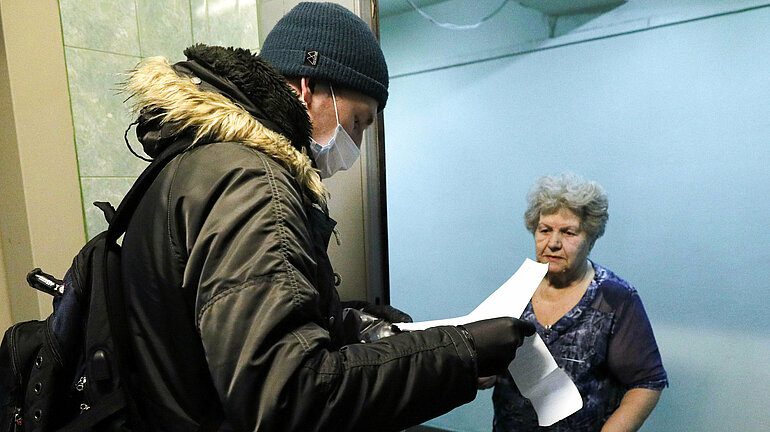Youth Citizenship in Russia: Between Patriotism and Informal Commitment

Who is a citizen? What rights and duties does a citizen have? How can a person express citizenship and solidarity? These are important questions on the agendas of modern states. Young people are looking for answers, including in Russia, where the norms, forms, and vocabularies of civic participation have been intensively defined and redefined over the past three decades, and where cultural differences between generations can lead to significant divides.
The state, civil society, and youth
Since the beginning of the 2000s, when Russian president Vladimir Putin came to power, a special political regime has been emerging in Russia. In the terminology of political scientist Vladimir Gelman, it can be called ‘personalist electoral authoritarianism’, which is characterised, among other things, by a total strengthening of state control with an imitation of democratic processes. Researchers have described the prospects for the development of civil society and relations between the state and society as a whole as ‘gloom and doom’.
Especially since the 2010s, access to the public space for initiatives not controlled by the state has been significantly reduced in Russia. Legislation on the organisation and conduct of public mass events, including protests and direct action, has been considerably tightened. The regulation of the activities of NGOs has changed; the number of organisations, media outlets, and individuals recognised as ‘foreign agents’ is growing; and human rights organisations are being liquidated.
Youth policy in Russia is built around the education of militarised patriotism. Young people are expected to be proud of the country’s military past and its willingness to physically and morally defend the homeland. The youth are also expected to show support for so-called traditional values. Civic activity is expected to take only two forms: participation in formalised political institutions and social inclusion in state-sanctioned activities. For the state, youth citizenship is primarily about patriotism and loyalty.
Youth participation in formal and informal politics
At the same time, in Russia, as in other European countries, there is a general decline in young people’s participation in institutionalised politics compared with previous generations. Only about 30 per cent of young people took part in the 2016 election to the State Duma, and approximately 3.5 per cent of young people are members of political parties. About 11 per cent trust official political institutions, while almost 41 per cent do not. Fifty-seven per cent of young people are not interested in politics, and only 19 per cent show some interest in it.
That said, young people are increasingly involved in informal politics, expressing their civic positions in ways other than taking part in elections. For example, according to the Levada Center, 22 per cent of Russia’s youth have signed political petitions or appeals, 11 per cent have participated in political actions or initiatives on the internet, and 9 per cent have stopped buying certain goods for political or environmental reasons. In addition, a 2020 survey by the Higher School of Economics showed that the youth are actively involved in volunteering: people in Russia aged 24–34 volunteer more often than the overall adult population.
Citizenship as day-to-day caring
Research by the Centre for Youth Studies at the Higher School of Economics in St Petersburg has shown that young people are critical of the state-imposed model of patriotism and are actively looking for ways to implement their own ideas about citizenship. Although they see traditional channels of civic participation as ineffective and often dangerous, young people have not abandoned the idea of active citizenship. Instead, they have shifted their attention to daily life and arm’s-length activities, where they can have an influence or bring about change by relying on their own resources. For example, young people form and develop neighbourhood, cultural, and urban communities, help excluded groups, get involved in environmental activities, and support each other and people nearby.
Such day-to-day caring gives young people the opportunity, on the one hand, to exercise citizenship outside the formal political field and, on the other, to go beyond private life. Young Russians emphasise that citizenship goes beyond the limits of their individual lives; rather, it is an activity directed towards other people and problematic situations. This is what makes the younger generation very different from their parents, for whom the devaluation of political participation has led to the privatisation of citizenship – in the form of moral and ethical attitudes of ‘being a good person’ – and private duties such as working and paying taxes.
Russia’s youth, like their Western peers, are forming a new model of citizenship, focused on day-to-day activities. In the Russian context, however, private daily life and informal communities are the only spaces in which young people can have an impact, since the public sphere is under the monopoly control of the state. Social involvement enables young people to develop their skills and abilities, expand the scope of their participation, and, in general, form agency. At the same time, pressure on NGOs and public associations in Russia does not allow young people to bring their groups into the public space. In sum, the youth form a kind of civil reality largely parallel to the state, in which they try to both run away from it and resist it.
Nadya Nartova is a senior research fellow at the Centre for Youth Studies at the Higher School of Economics in St Petersburg, Russia.